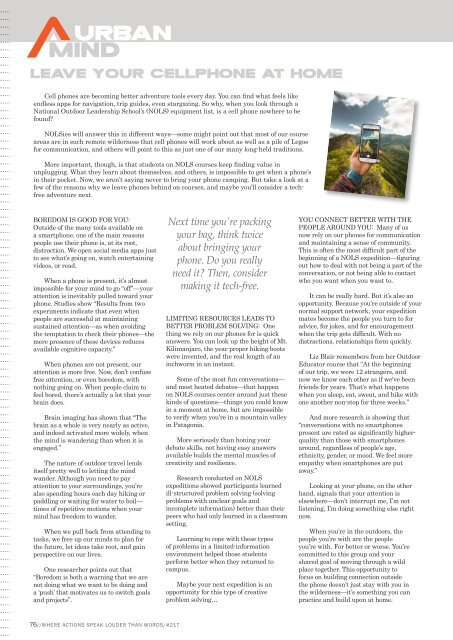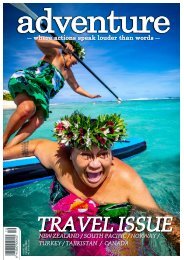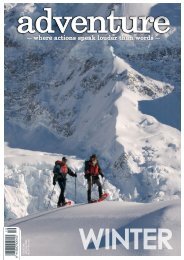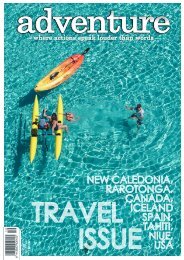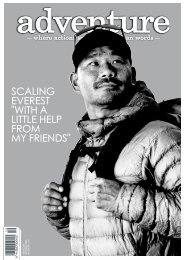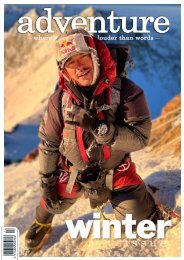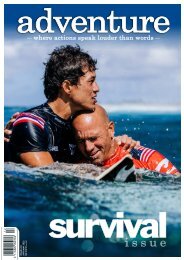Adventure Magazine December 2019/January 2020
Issue @217 - Xmas issue Waves, water, camping and more
Issue @217 - Xmas issue
Waves, water, camping and more
Create successful ePaper yourself
Turn your PDF publications into a flip-book with our unique Google optimized e-Paper software.
.....<br />
.....<br />
.....<br />
.....<br />
.....<br />
.....<br />
.....<br />
.....<br />
.....<br />
.....<br />
.....<br />
.....<br />
.....<br />
.....<br />
.....<br />
.....<br />
.....<br />
.....<br />
.....<br />
.....<br />
.....<br />
.....<br />
.....<br />
.....<br />
.....<br />
.....<br />
.....<br />
.....<br />
.....<br />
.....<br />
.....<br />
.....<br />
.....<br />
.....<br />
.....<br />
.....<br />
.....<br />
.....<br />
.....<br />
.....<br />
.....<br />
.....<br />
.....<br />
.....<br />
.....<br />
.....<br />
.....<br />
.....<br />
.....<br />
.....<br />
.....<br />
.....<br />
.....<br />
.....<br />
.....<br />
.....<br />
.....<br />
.....<br />
.....<br />
.....<br />
.....<br />
.....<br />
.....<br />
.....<br />
.....<br />
.....<br />
.....<br />
.....<br />
.....<br />
.....<br />
.....<br />
.....<br />
.....<br />
.....<br />
.....<br />
.....<br />
.....<br />
.....<br />
.....<br />
.....<br />
.....<br />
.....<br />
.....<br />
URBAN<br />
MIND<br />
LEAVE YOUR CELLPHONE AT HOME<br />
Cell phones are becoming better adventure tools every day. You can find what feels like<br />
endless apps for navigation, trip guides, even stargazing. So why, when you look through a<br />
National Outdoor Leadership School’s (NOLS) equipment list, is a cell phone nowhere to be<br />
found?<br />
NOLSies will answer this in different ways—some might point out that most of our course<br />
areas are in such remote wilderness that cell phones will work about as well as a pile of Legos<br />
for communication, and others will point to this as just one of our many long-held traditions.<br />
More important, though, is that students on NOLS courses keep finding value in<br />
unplugging. What they learn about themselves, and others, is impossible to get when a phone’s<br />
in their pocket. Now, we aren’t saying never to bring your phone camping. But take a look at a<br />
few of the reasons why we leave phones behind on courses, and maybe you’ll consider a techfree<br />
adventure next.<br />
BOREDOM IS GOOD FOR YOU:<br />
Outside of the many tools available on<br />
a smartphone, one of the main reasons<br />
people use their phone is, at its root,<br />
distraction. We open social media apps just<br />
to see what’s going on, watch entertaining<br />
videos, or read.<br />
When a phone is present, it’s almost<br />
impossible for your mind to go “off”—your<br />
attention is inevitably pulled toward your<br />
phone. Studies show “Results from two<br />
experiments indicate that even when<br />
people are successful at maintaining<br />
sustained attention—as when avoiding<br />
the temptation to check their phones—the<br />
mere presence of these devices reduces<br />
available cognitive capacity.”<br />
When phones are not present, our<br />
attention is more free. Now, don’t confuse<br />
free attention, or even boredom, with<br />
nothing going on. When people claim to<br />
feel bored, there’s actually a lot that your<br />
brain does.<br />
Brain imaging has shown that “The<br />
brain as a whole is very nearly as active,<br />
and indeed activated more widely, when<br />
the mind is wandering than when it is<br />
engaged.”<br />
The nature of outdoor travel lends<br />
itself pretty well to letting the mind<br />
wander. Although you need to pay<br />
attention to your surroundings, you’re<br />
also spending hours each day hiking or<br />
paddling or waiting for water to boil—<br />
times of repetitive motions when your<br />
mind has freedom to wander.<br />
When we pull back from attending to<br />
tasks, we free up our minds to plan for<br />
the future, let ideas take root, and gain<br />
perspective on our lives.<br />
One researcher points out that<br />
“Boredom is both a warning that we are<br />
not doing what we want to be doing and<br />
a ‘push’ that motivates us to switch goals<br />
and projects”.<br />
Next time you’re packing<br />
your bag, think twice<br />
about bringing your<br />
phone. Do you really<br />
need it? Then, consider<br />
making it tech-free.<br />
LIMITING RESOURCES LEADS TO<br />
BETTER PROBLEM SOLVING: One<br />
thing we rely on our phones for is quick<br />
answers. You can look up the height of Mt.<br />
Kilimanjaro, the year proper hiking boots<br />
were invented, and the real length of an<br />
inchworm in an instant.<br />
Some of the most fun conversations—<br />
and most heated debates—that happen<br />
on NOLS courses center around just these<br />
kinds of questions—things you could know<br />
in a moment at home, but are impossible<br />
to verify when you’re in a mountain valley<br />
in Patagonia.<br />
More seriously than honing your<br />
debate skills, not having easy answers<br />
available builds the mental muscles of<br />
creativity and resilience.<br />
Research conducted on NOLS<br />
expeditions showed participants learned<br />
ill-structured problem solving (solving<br />
problems with unclear goals and<br />
incomplete information) better than their<br />
peers who had only learned in a classroom<br />
setting.<br />
Learning to cope with these types<br />
of problems in a limited-information<br />
environment helped those students<br />
perform better when they returned to<br />
campus.<br />
Maybe your next expedition is an<br />
opportunity for this type of creative<br />
problem solving…<br />
YOU CONNECT BETTER WITH THE<br />
PEOPLE AROUND YOU: Many of us<br />
now rely on our phones for communication<br />
and maintaining a sense of community.<br />
This is often the most difficult part of the<br />
beginning of a NOLS expedition—figuring<br />
out how to deal with not being a part of the<br />
conversation, or not being able to contact<br />
who you want when you want to.<br />
It can be really hard. But it’s also an<br />
opportunity. Because you’re outside of your<br />
normal support network, your expedition<br />
mates become the people you turn to for<br />
advice, for jokes, and for encouragement<br />
when the trip gets difficult. With no<br />
distractions, relationships form quickly.<br />
Liz Blair remembers from her Outdoor<br />
Educator course that “At the beginning<br />
of our trip, we were 12 strangers, and<br />
now we know each other as if we've been<br />
friends for years. That's what happens<br />
when you sleep, eat, sweat, and hike with<br />
one another non-stop for three weeks.”<br />
And more research is showing that<br />
“conversations with no smartphones<br />
present are rated as significantly higherquality<br />
than those with smartphones<br />
around, regardless of people’s age,<br />
ethnicity, gender, or mood. We feel more<br />
empathy when smartphones are put<br />
away.”<br />
Looking at your phone, on the other<br />
hand, signals that your attention is<br />
elsewhere—don’t interrupt me, I’m not<br />
listening, I’m doing something else right<br />
now.<br />
When you’re in the outdoors, the<br />
people you’re with are the people<br />
you’re with. For better or worse. You’re<br />
committed to this group and your<br />
shared goal of moving through a wild<br />
place together. This opportunity to<br />
focus on building connection outside<br />
the phone doesn’t just stay with you in<br />
the wilderness—it’s something you can<br />
practice and build upon at home.<br />
76//WHERE ACTIONS SPEAK LOUDER THAN WORDS/#217


